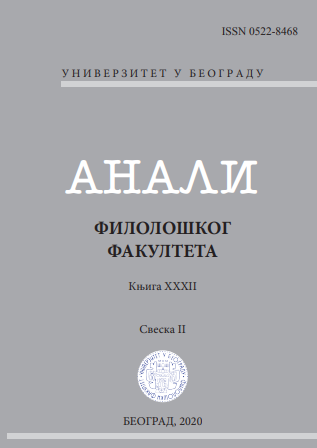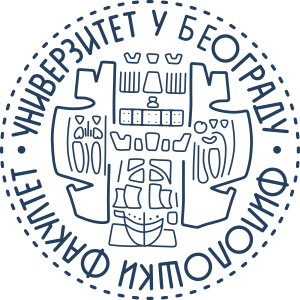Да ли је Америка крмача која прождире свој окот: Апдајков Терориста као образовни роман
DOI:
https://doi.org/10.18485/analiff.2020.32.2.5Кључне речи:
Џон Апдајк, Терориста, образовни роман, исламски фундаментализам, Ахмед Ашмави Малој, развој, епифанијаАпстракт
Теза овог рада је да се двадесет други роман Џона Апдајка, Терориста (2006), може посматрати као образовни роман (Bildungsroman). Истраживање се заснива на теоријским увидима о овом романескном облику које нуде најпре Хегел, Лукач и Бахтин, али се консултују и савремени теоретичари овога појма. Једна од основних одлика образовног романа је промена кроз коју пролази млади човек, а која има пресудну улогу у формирању његове личности. Та промена настаје на основу дијалектичког односа између сопства и околине. Међу проучаваоцима доминира становиште да се сукоб у оквиру образовног романа успешно решава, тако што долази до компромиса између сопства и света. На основу анализе Терористе Џона Апдајка проверићемо да ли се ово дело – и под којим условима – може сврстати у традицију образовног романа. При томе ћемо, између осталог, Апдајков роман смештати и у компаративни контекст, тако што ћемо га у одређеним аспектима поредити са Џојсовим Портетом уметника у младости, а спорадично и са Мановим Чаробним брегом. Коначно, један од (посредних) циљева рада је и да укаже на поетичке тенденције савременог образовног романа.
Downloads
Downloads
Објављено
Број часописа
Рубрика
Лиценца

Овај рад је под Creative Commons Aуторство-Дели под истим условима 4.0 Интернационална лиценца.
Authors who publish with this journal agree to the following terms:
- Authors are confirming that they are the authors of the submitting article, which will be published (print and online) in the journal Anali filološkog fakulteta by the Faculty of Philology, University of Belgrade (Faculty of Philology, Studentski trg 3, 11000 Belgrade, Serbia). Author’s name will be evident in the printed article in the journal. All decisions regarding layout and distribution of the work are in hands of the publisher.
- Authors guarantee that the work is their own original creation and does not infringe any statutory or common-law copyright or any proprietary right of any third party. In case of claims by third parties, authors commit their self to defend the interests of the publisher, and shall cover any potential costs.
- Authors retain copyright and grant the journal right of first publication with the work simultaneously licensed under a Creative Commons Attribution-ShareAlike 4.0 International License that allows others to share the work with an acknowledgement of the work's authorship and initial publication in this journal.
- Authors are able to enter into separate, additional contractual arrangements for the non-exclusive distribution of the journal's published version of the work (e.g., post it to an institutional repository or publish it in a book), with an acknowledgement of its initial publication in this journal.
- Authors are permitted and encouraged to post their work online (e.g., in institutional repositories or on their website) prior to and during the submission process, as it can lead to productive exchanges, as well as earlier and greater citation of published work.





